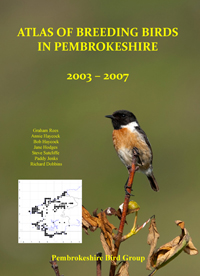Breeding resident
Blue Tits have been common since Mathew's (1894) time and breed in a variety of habitats, including urban areas where they utilise holes in masonry and nest-boxes, and are only absent from the tops of the Preseli Mountains and all of the offshore islands save well-wooded Caldey. Census data from the Dyfed Wildlife Trust reserves of Rosemoor, Old Mill Grounds and Pengelli Forest, suggest an average of 60 pairs per tetrad which would amount to a county total of about 24,000 pairs.
They are eruptive in some autumns, like Coal Tits, and flocks are seen wandering q about the open coast, some reaching the offshore islands, with up to 50 at Skokholm in October 1957 and 1964 and 85 at Skomer in October 1991.

Fieldwork 1984-88 (based on 478 tetrads)
Red = breeding confirmed = 302
Orange = breeding probable = 54
Yellow = breeding possible = 52
Total tetrads in which registered = 408 (85.4%)
Donovan J.W. & Rees G.H (1994), Birds of Pembrokeshire
 Sunday, August 4, 2013 at 9:40AM
Sunday, August 4, 2013 at 9:40AM 





